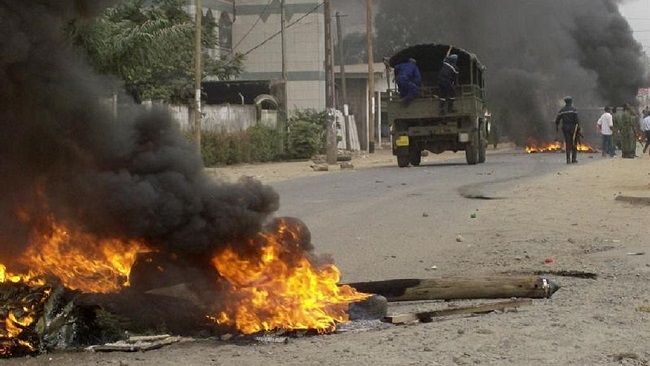Cameroon Slowly Moving To A War Zone
In recent years, Cameroon – a peaceful country in Central Africa ruled by President Paul Biya – has transitioned from a tranquil harbor to a site of horror. The Cameroonian army has been battling with Boko Haram militants on the northern border alongside security forces from Nigeria, Niger, and Chad. The conflict has registered over 20,000 dead and 2.4 million people displaced. The former French colony has also been struggling with a secessionist uprising in the English- speaking Northwest and Southwest Regions since 2016, with hundreds of deaths over the course of the confrontation. Furthermore, clashes with rebels from the Central African Republic in Bertoua and a very tense political atmosphere have plunged the country into an unending crisis.
Many of these crises are attributed to the unlawful arrest of Professor Maurice Kamto, the main opposition leader in Cameroon, after his organization of peaceful protests in the towns of Douala and Yaoundé on 28 January, 2019. Kamto was arrested at the home of a leading supporter, Albert Dzongang, before Dzongang and other supporters such as Christian Penda Ekoka, Alain Fogue, and Celetine Djamen were also arrested for participating in the organization of these peaceful protests.
It was clear from the evidence Kamto brought forward to the Constitutional Council before the announcement of the winner of the 2018 presidential election in Cameroon that Paul Biya supporters affected the results of the election in favour of his party, the ruling Cameroon People Democratic Movement (CPDM).
While protests went viral in Cameroon under Kanto’s leadership of the Movement for the Rebirth of Cameron (MRC), some fifty protesters opposed to Biya broke into the country’s Paris embassy, vandalizing portraits of him. The demonstrators filmed themselves invading the empty offices in the French Capital’s 16th district around 7: 00 PM on Saturday, broadcasting the protest live on Facebook. However, French law enforcement agents forced them out of the building and onto the street two hours later, where they continued their protest outside the embassy. Daniel Essissima, one of the protesters, stated: “The Cameroon administrators are taking Cameroonians for idiots… …They cannot bring people to rock-bottom like this. In the anglophone regions the army is killing people; in Douala, they are firing with real bullets.”
Because the attack on the Cameroonian Embassy in Paris took place on the same day as the protest organized in Cameroon, the Cameroonian authorities have since linked both demonstrations without providing any proof of this conclusion. Kamto vehemently denies these claims, separating himself from any violent attack perpetrated at Cameroon’s diplomatic mission abroad.
Following Kamto’s arrest, around 300 people gathered outside Dzongang’s house, and on Saturday 117 people were arrested during protest marches in several towns. Kamto has continued to claim he was the rightful winner of last October’s presidential election, which saw veteran leader Paul Biya win a seventh consecutive presidential term. The MRC has blasted this election as an “electoral hold-up.” Paul Biya has been ruling Cameroon since 1982 with the support of the army, government administrations, and the CPDM.
International Condemnation of Kamto’s Arrest
Last month, human rights groups condemned Kamto’s arrest and called for his immediate release, orders which fell on deaf ears. The European Union this month accused Cameroon of a “disproportionate use of force” in dispersing the protests. “Finding a solution to the challenges faced by the country can only be achieved through dialogue in a calm and inclusive atmosphere where fundamental rights and the rule of law are respected,” stated EU spokesman Maja Kocijancic. Amnesty International said the arrest of Kamto and his staff “signals an escalating crackdown on opposition leaders, human rights defenders and activists in Cameroon.” Amnesty International’s West and Central Africa director Samira Daoud claimed that “instead of taking steps towards improving the country’s human rights record, we are witnessing the authorities becoming less and less tolerant of criticism. This must stop.”
Professor Kamto Post-Arrest
After being taken to the Groupement Special d’Opération (GSO) in Yaoundé, Kamto appeared before judges in the Military tribunal on Friday 1 February, 2019 and charges against him were made known to the public. Kamto is being charged with insurrection, hostility against the fatherland, group rebellion, and public disorder. Just last week, Kamto and fellow party members Albert Dzongang, Clestine Djamen, Christian Penda Ekoka, and Paul Eric Kingue were all transferred to the Principal Prison in Kondengui while investigations are ongoing. This action by the government goes a long way to instill fear and repression in the heart of any group that wants to take to the street for any type of demonstration. Minister Atangana Nji in the Ministry of Territorial Administration and Decentralization threatened to withdraw the MRC’s party licence, while Minister of Communication Rene Emmanuel said that because Kamto protest disrupted public order and perpetrated various assaults he will face the court’s judgement.
It is very clear that after President Biya and his supporters fixed the election in their favour it will be difficult for the people of Cameroon to express their dissatisfaction, even when their fundamental human rights have been violated by the present administration. The only means by which the Cameroonian people can express gross dissatisfaction, through peaceful streets protests dubbed “white marches,” has been taken away from them and led to unending new forms of crisis.
Source: Organisation For World Peace




